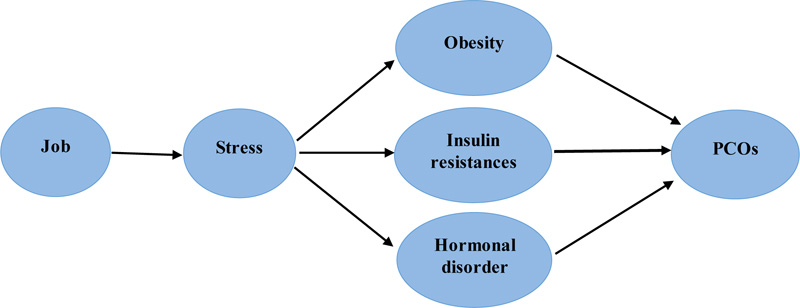REVIEW ARTICLE
Is the Risk of Polycystic Ovary Syndrome among Working Women Higher and Vice Versa?
Maryam Feiz Arefi1, 2, Zahra Pajohideh3, Gholamheidar Teimori-Boghsani1, 2, Amin Babaei-Pouya4, *
Article Information
Identifiers and Pagination:
Year: 2022Volume: 15
E-location ID: e187494452207131
Publisher ID: e187494452207131
DOI: 10.2174/18749445-v15-e2207131
Article History:
Received Date: 10/1/2022Revision Received Date: 2/3/2022
Acceptance Date: 11/5/2022
Electronic publication date: 01/11/2022
Collection year: 2022

open-access license: This is an open access article distributed under the terms of the Creative Commons Attribution 4.0 International Public License (CC-BY 4.0), a copy of which is available at: https://creativecommons.org/licenses/by/4.0/legalcode. This license permits unrestricted use, distribution, and reproduction in any medium, provided the original author and source are credited.
Abstract
Introduction:
Polycystic ovary syndrome (PCOS), an endocrine glands disorder, caused by hormonal imbalance, is featured by diverse potential effects for women; while individuals perpend to those that are affecting appearance and menstruation disorder. Our aim was to assess PCOS risk factors in working women.
Materials and Methods:
The study was carried out as a literature review work through searching databases including Scopus, PubMed, and ScienceDirect for papers published before December 2019. The databases were searched for the terms such as PCO, job stress, and risk factors of PCO. Risk factors for polycystic ovarian syndrome and occupational risk factors for working women were investigated.
Results and Discussion:
There are several reasons known for PCOS like obesity and insulin resistance along with the stressors that increase its risk. Working women tend to be exposed to several stressors and being in charge of home affairs creates a higher workload and intensified stresses. The risk of PCOS is higher in women with higher stressors at work.
Conclusions:
Working women experience many stressors and taking into account that stress is a precursor or intensifier of PCOS risk factors, working women are at a higher risk of PCOS compared with housewives.
1. INTRODUCTION
Polycystic ovary syndrome (PCOS), a disorder of endocrine glands, is caused by hormonal imbalance in women [1]. This syndrome is a silent and non-contagious disease [2] and appears as a sort of insulin resistance in women along with probable changes in cortisol and melatonin secretion; which are the key indicators of the hypothalamus, hypophyses, and adrenal function [2, 3]. According to the National Institute of Health (NIH) and Rotterdam Criteria, the prevalence of PCOS is about 6-10% and 15%, respectively [4]. The syndrome causes a variety of diverse and notable complications such as infertility, hypoestrogenism, hirsutism, insulin resistance, glucose intolerance, diabetes type II, and cardiovascular disorder; in addition to causing anxiety, depression, and low quality of life [1]. Despite all these problems, there is no public awareness of PCOS [5]. Previous studies showed that women with PCOS suffer from higher social stress and other life stresses as well. One of them is occupational stress, which is the second occupational health related to work [6]. By definition, occupational stress refers to any non-useful psychological or physical response caused by a lack of fitness between the responsibility assigned at work and one’s capabilities, which might lead to aggressive behaviors, work accidents, psychological and mental disorders, or even death. It affects one’s health and quality of life and increases the risk of work accidents. Moreover, stress might cause destructive effects on physical and psychological health including hypertension, heart attack, depression, and anxiety [7].
Chronic depression might cause changes in nutritional habits so that many find overeating a way to fight stress, which leads to obesity and abdominal fat – both as key risk factors for diabetes type II [8, 9]. In addition, unhealthy nutrition results in insulin resistance so there is a significant relationship between insulin resistance and clinical problems like non-alcoholic fatty liver and PCOS. On the other hand, some of the occupational risk factors like the inconsistency of circadian rhythm, overnight sleep disruption, the polluted environment at work (particles, solvents), exposure to heavy metals (arsenic, mercury) or stable organic pollutants increase the risk of insulin resistance [10]. Many jobs are featured with these risk factors. As shown by other studies, anxiety, depression, and lack of physical activity are very common in women with POCS.3,9 In general, working women are under heavy stress in addition to their work since they are in charge of home affairs. Therefore, the hypothesis of the present study is that working women are at a higher risk of developing PCOS. Our aim was to assess PCOS risk factors in working women.
2. METHODS
The study was carried out as a literature review work through searching databases including Scopus, PubMed, and ScienceDirect for papers published before December 2019.
The databases were searched for the terms such as” Poly-cystic ovary syndrome”, “PCOs”, “stress”, “job stress”, “working women”, and ”risk factors of PCOs”.
The other references were also reviewed to find the papers that might have been overlooked when searching the databases. Moreover, the studies published in English were selected for analysis. Studies, which investigated irrelevant outcomes and lacked sufficient information for analysis, were excluded. Finally, the search results were reviewed by two authors independently after removing duplicates. The information of the studies, which entered the final phase, was extracted and investigated. All procedures carried out in accordance with the ethical committee of Shoushtar Faculty of Medical Sciences (No. IR.SHOUSHTAR.REC.1399.04).
3. RESULTS
3.1. Risk Factors of PCOS
A variety of risk factors such as obesity, insulin resistance, and hormonal disorders play a role in the development of PCOS [7, 9]. According to the results of studies, stress can be influential as an intermediate factor in the development or intensification of these risk factors. These relationships are further discussed in the following sections:
3.2. Stress and Obesity
Chronic stress increases the risk of changes in nutritional habits and consequential obesity is a risk factor for diseases like diabetes, cardiovascular disease, and PCOs. Overeating is a strategy to fight stress, which results in obesity and abdominal fat – i.e. two main risk factors of diabetes type II [9]. Social stresses like aggression, domination, and work pressure all may lead to diseases like diabetes type II. The prevalence of PCOS in underweight, normal, overweight, and obese women were 8.2, 9.8. 9.9, 9.0% respectively. Therefore, the risk of PCOs increases with obesity [4-6]. Studies have also shown that anxiety, depression, and lack of physical activity are common in women with PCOS.
3.3. Stress and Insulin Resistance
PCOS is a type of insulin resistance that is only developed by women. Some of the occupational risk factors like the inconsistency of circadian rhythm and overnight sleep disorders caused by overnight work shifts, exposure to pollution (particles, solvents), heavy metals (arsenic, mercury) or, organic pollutants increase the risk of developing insulin resistance. In turn, insulin resistance leads to cardiovascular diseases and diabetes. There is a significant relationship between insulin resistance and clinical problems like non-alcoholic fatty liver and PCOS [9]. Studies have shown that occupational stress creates unhealthy habits like unhealthy nutrition that results in insulin resistance. Tianwei Xu et al. showed that social stresses like aggression, domination, and work pressure may lead to diabetes type II [8], which is an outcome of insulin resistance.
3.4. Stress and Hormonal Disorders
In terms of pathology, PCOS includes hyperandrogenic and probable changes in cortisol and melatonin secretion that reflect the function of the hypophyses and adrenal hypothalamus. Each of the elements of stress paths can halt reproduction function. Severe stress and ovulation failure disrupt steroidogeneses and angiogenesis. Chronic stress intensifies general catabolic conditions; therefore, constant hyperactivity (HPA) might gradually lead to a reduction of lean body mass (muscle and bone) and an increase in visceral fat and insulin resistance, which in turn affects the HPO axis. In the case of PCOS, chronic stress is one of the hemostatic disorders that leads to an endocrine disorder. Functional hypothalamic amenorrhea (FHA) is a chronic annulation that is not diagnosable due to organic reasons. It is mostly associated with stress, weight loss, hyperactivity, or a combination of them. A decrease in GnRH outcome at LH and FSH levels is not enough to preserve folliculogenesis and ovary function [7]. Moreover, psychological stress intensifies hypothalamus amenorrhea through decreasing the HPS activity [7].
3.5. Work and PCOS
There is a relationship between the expansion of stress symptoms and demanding work, low decision-making skills, and low social support [11]. Studies have shown that female managers feel more stress than male ones and the source of this stress is the social roles and expectations of women. This explains the fact that female managers are still a minority [12].
Studies in the USA have shown that women in stressful jobs are twice at the risk of short menstruation in comparison to the ones in non-stressful jobs. The risk of breast cancer is higher in women with shorter menstruation cycles [13]; in addition, the rate of ovary and womb cancers is higher in these women [14].
 |
Fig (1). Relationship between job stress and PCO. |
Occupational stress or other occupational risk factors have an indirect impact on PCOS in working women by creating insulin resistance, obesity, and hormonal distress (Fig. 1).
CONCLUSION
Working women experience many stressors depending on their job and being in charge of home affairs at the same time increases their stress and workload. Taking into account that stress is a precursor or intensifier of PCOS risk factors (e.g. obesity, insulin resistance, and hormonal disorder), working women are at a higher risk of PCOS compared with housewives.
LIST OF ABBREVIATION
| PCOS | = Polycystic Ovary Syndrome |
CONSENT FOR PUBLICATION
Not applicable.
FUNDING
None.
CONFLICT OF INTEREST
The authors declare no conflict of interest, financial or otherwise.
ACKNOWLEDGEMENTS
The authors would like to thank the university and all those who contributed to this research.









